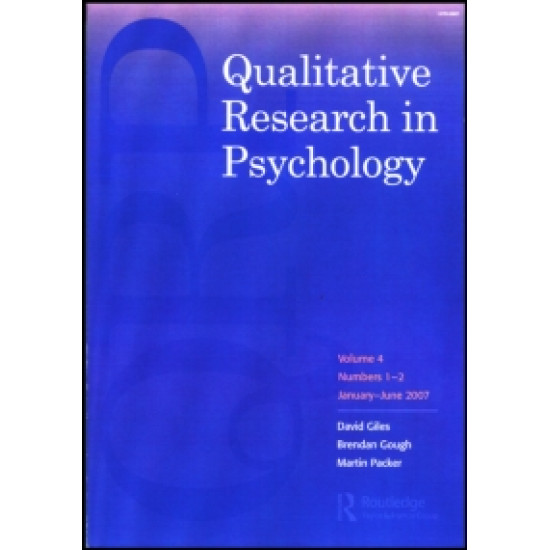
Qualitative Reseacrh in Psychology
Aims and Scope
Qualitative Research in Psychology is a leading forum for qualitative researchers in all areas of psychology and seeks innovative and pioneering work that moves the field forward. The journal has published state-of-the-art debates on specific research approaches, methods and analytic techniques, such as discourse analysis, interpretative phenomenological analysis, visual analyses and online research, the role of qualitative research in specific fields such as psychosocial studies and feminist psychology, and the teaching of qualitative methods in the undergraduate curriculum and on clinical psychology training programs. The journal has also published informative articles on specific aspects of qualitative research processes such as ethics, transcription, and interviewee recruitment, and helped to promote innovative research techniques such as photovoice, autoethnography, template analysis, and psychogeography. Our audience consists of psychology professionals using qualitative methods of inquiry in research in academic, clinical, or occupational settings. While the majority of readers will have an interest in psychology as a discipline, Qualitative Research in Psychology is strongly interdisciplinary in focus and aims to increase awareness of psychology as a social science that embraces a variety of qualitative approaches.
By representing the full range of qualitative approaches to psychological research, Qualitative Research in Psychology continues to:
Peer Review Policy: All research articles in this journal have undergone rigorous peer review, based on initial editor screening and anonymous double-blind review.
Qualitative Research in Psychology is a leading forum for qualitative researchers in all areas of psychology and seeks innovative and pioneering work that moves the field forward. The journal has published state-of-the-art debates on specific research approaches, methods and analytic techniques, such as discourse analysis, interpretative phenomenological analysis, visual analyses and online research, the role of qualitative research in specific fields such as psychosocial studies and feminist psychology, and the teaching of qualitative methods in the undergraduate curriculum and on clinical psychology training programs. The journal has also published informative articles on specific aspects of qualitative research processes such as ethics, transcription, and interviewee recruitment, and helped to promote innovative research techniques such as photovoice, autoethnography, template analysis, and psychogeography. Our audience consists of psychology professionals using qualitative methods of inquiry in research in academic, clinical, or occupational settings. While the majority of readers will have an interest in psychology as a discipline, Qualitative Research in Psychology is strongly interdisciplinary in focus and aims to increase awareness of psychology as a social science that embraces a variety of qualitative approaches.
By representing the full range of qualitative approaches to psychological research, Qualitative Research in Psychology continues to:
- stimulate discussion of the relative merits of different qualitative methods in psychology by hosting key debates in the field by leading authors;
- provide a showcase for exemplary and innovative qualitative research projects in psychology, with regular special issues highlighting developments in the methodological literature;
- maintain high standards for the conduct and reporting of qualitative research with a rigorous review and editorial policy;
- strengthen the relationship between psychology and other social and human sciences where qualitative inquiry has a long track record and;
- place qualitative psychological inquiry appropriately within the scientific, paradigmatic, and philosophical issues that it raises.
Peer Review Policy: All research articles in this journal have undergone rigorous peer review, based on initial editor screening and anonymous double-blind review.
Peer Review Policy: All research articles in this journal have undergone rigorous peer review, based on initial editor screening and anonymous double-blind review.
Publication office: Taylor & Francis, Inc., 530 Walnut Street, Suite 850, Philadelphia, PA 19106.
₹36,668.70





